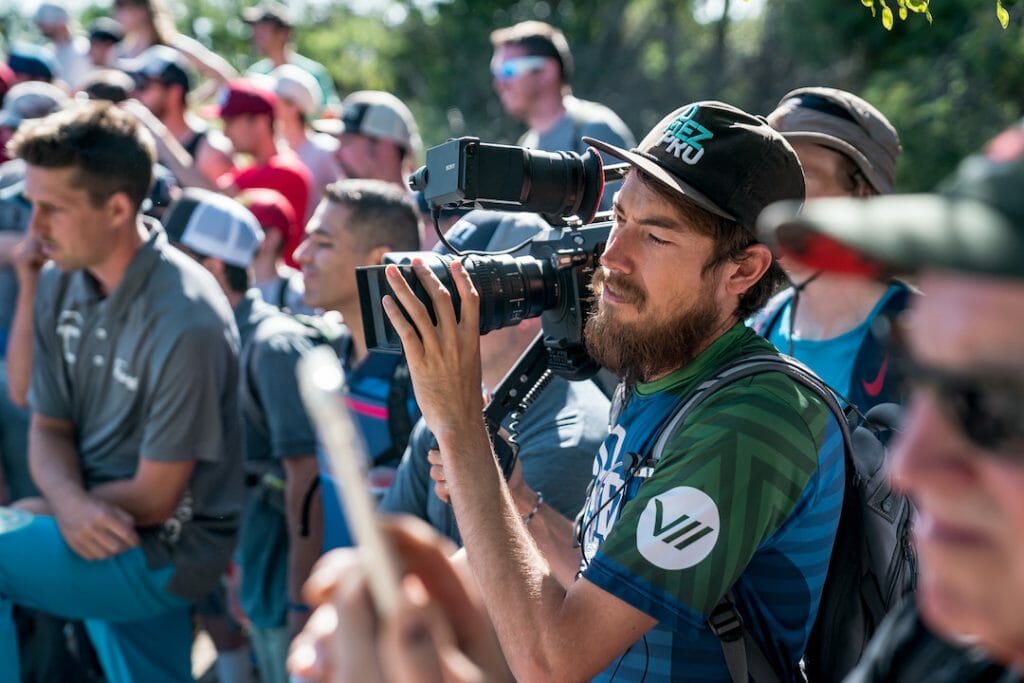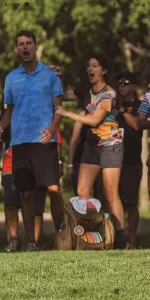Live disc golf is quickly taking market share -- and the Pro Tour holds the cards.
September 22, 2022 by Matt Thompson in Opinion with 0 comments

The 2022 edition of the World Championships was ripe for disappointment. Expectations were too high. The courses were too dull. The follow up to last year’s masterpiece was surely destined for a letdown, with DGN’s decision to release the Holy Shot documentary alongside this year’s event just a salve for the incoming wound.
Largely, that is not what happened. FPO crowned only its second European champion in history in Kristin Tattar, and MPO went to a playoff for a second straight year, with Paul McBeth winning his sixth world title in dramatic fashion over the Cinderella story Aaron Gossage.
Chalk up another win for live disc golf coverage.
It is tempting to focus on how the week in Emporia proves the model of live coverage, with tens of thousands of people taking hours out of their day on a holiday weekend to watch disc golf, but let’s go back a little further.
***
The story of disc golf media is a story of two world championships nearly a decade apart. The first is the Charlotte World Championships in 2012, the second the 2021 edition from Ogden, Utah. The former marks the first instance of Jonathan Gomez uploading disc golf coverage to YouTube after taking his camera to film the final round battle between Paul McBeth and Ricky Wysocki, the story now the stuff of Jomez legend. The latter is James Conrad’s “Holy Shot” from last year’s final hole in regulation. Both moments rewrote the disc golf media landscape.
Gomez was not the first person to film a disc golf tournament. Long-time aficionados will remember McFlySoHigh, Central Coast Disc Golf, and, of course, the ever-present Terry Miller posting content from the course as far back as 2010. What Gomez did that was revolutionary was turn disc golf coverage into a successful business and prove the market was there and hungry for more. The amount of post-produced disc golf coverage has proliferated in the years since, with providers like GK Pro, Gatekeeper Media, Ace Run Productions, and others becoming household names among fans.
In 2012, the Disc Golf Pro Tour was just a twinkle in Steve Dodge’s eye and the Disc Golf Network was unimaginable. For fans of disc golf, just seeing the final nine holes of Worlds on camera was a blessing. By 2021, things were dramatically different. There’s no need to rehash the story of disc golf’s pandemic boom, but nine years after that 2012 final nine, the Disc Golf Network’s live coverage was showing a new generation of fans how to experience disc golf drama.
The most important single throw of a disc in the history of the sport happened — and it happened live. Ian Anderson’s Whitmanesque yawp is seared indelibly into my brain and those of all who have heard it roughly 9,000 times since in the DGN commercial. There is no going back now. Anderson, the man behind one of the most popular post production outlets, Central Coast Disc Golf, is now perhaps the most recognizable face of “The Network” as he calls it on air, often pulling double duty, commentating on both FPO and MPO for entire tournaments. For his part, Anderson says that he doesn’t think post-production “will ever truly die” thanks in part to “the crazy places we play disc golf.” He adds that in the grand scheme of things, he believes live coverage is here to stay, and even if disc golf’s popularity plateaus as skateboarding or other niche sports have tended to do over the years, “live will keep grabbing views from post.”

While 2012 proved the market for Gomez’s product was there, 2021 proved he no longer had the best product in town. To be clear, Gomez’s team is the best in the business at what they do. The camera work is sharp, the commentary is beloved, and the graphics and music are the standard by which all other coverage is judged. But when James Conrad released that Envy and Calvin Heimburg’s face reached never before seen levels of emotional distress, something happened that couldn’t be adequately presented in post.
Watching the final round Jomez coverage of 2021 Worlds is a weird experience. It’s soap operatic. By the time it was uploaded, everyone knew exactly what happened, including the player-commentary team who were visible in the background on the final hole. Their responses to the throw in were awkward and forced. That’s not their fault. They’re disc golfers who take a competitive hit to do the commentary work. They aren’t actors and they shouldn’t have to be, but the moment perfectly illustrates the gap between the product post and live have to sell.
At the moment, Gomez and crew are far superior at the actual selling. Their website is better, their personalities are some of the biggest stars in the sport, and their merchandise is superior. Their e-commerce skills are evident, while DGPT.com/shop is more difficult to navigate and primarily consists of a series of items with the DGPT logo slapped on them. The Pro Tour and its network also pales in comparison in the communication department. There always seems to be the need for a “how to” email explaining how to navigate their product. That’s a problem.
The operative question is whether or not that gap will close. There’s no question that putting together a live television broadcast is an incredibly difficult and overhead-intensive task, one that DGN has dramatically improved at over the last few years. But as of now, the Disc Golf Pro Tour has never yet turned it into a yearly profit.
Ultimately, it’s the JomezPro team’s business acumen that paints the clearest picture of the future to come. For a decade, they’ve been ahead of the curve in disc golf content, and their current moves suggest live is very much on their mind. They purchased the post-production rights for all the Elite Series events from the pro tour this year for a highly-publicized $500,000, but it’s their other behavior that’s more interesting. They are leaning into what Ian Anderson describes as the fun content. The offseason “Putting Game” kept things going when no tournaments were ongoing. They have paired with Paige Pierce and her formidable marketability on a podcast, “Approachable;” with popular disc YouTuber Trash Panda Disc Golf on a disc golf history podcast “Patent Pending;” and they are bringing back the talk show style “Showmez.” All opportunities to further flex their e-commerce might, but what might be the most compelling move hit my inbox as I prepared to write this piece.
In case you don’t know already, what we’re doing is for the Final Round of Worlds this year we’re taking over the Granada Theater in Emporia and putting BigSexyBarri on stage to perform their commentary live in front of a packed house! We added special guests including StarFrame who’s going to perform a DJ set full of your favorite JomezPro tunes and with some surprises! You can expect tons of laughs and fun as we try something new for the first time!
The face of post produced disc golf content is dipping their toe into live content, albeit through a side door. It’s a great idea, even if their first attempt had some hiccups that inevitably pop up during live broadcasts! While holding onto their post-produced business, they are also riding the winds of change as they always have. This – as Disney’s cash cow bounty hunter says – is the way. I expect to see the other post production outlets follow suit: to continue to improve their tournament coverage, to diversify their product line, and inevitably to get into the business of live events. Whether or not this is able to sustain their business, clearly predicated on showing round coverage, remains to be seen. For my money, Gomez and crew will find a way to make it work, even in a world where the Pro Tour stops selling lead card rights to outside post-production companies.
So, is post-produced coverage doomed? I don’t believe so, but its time of dominance is likely coming to an end sooner rather than later. Only those willing to adapt will survive.
Correction: Paige Pierce’s podcast is titled ‘Approachable,’ not ‘Unapproachable’